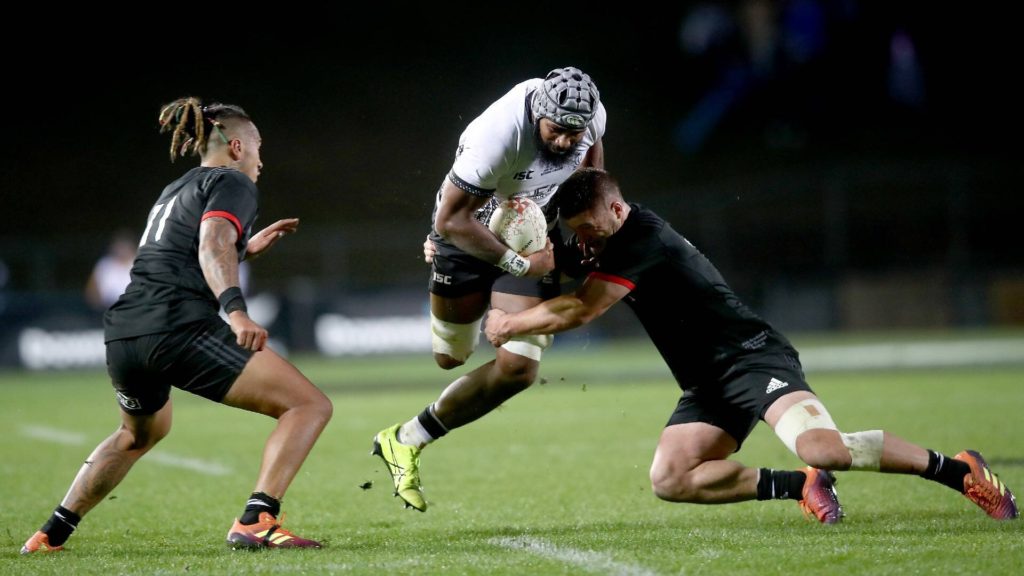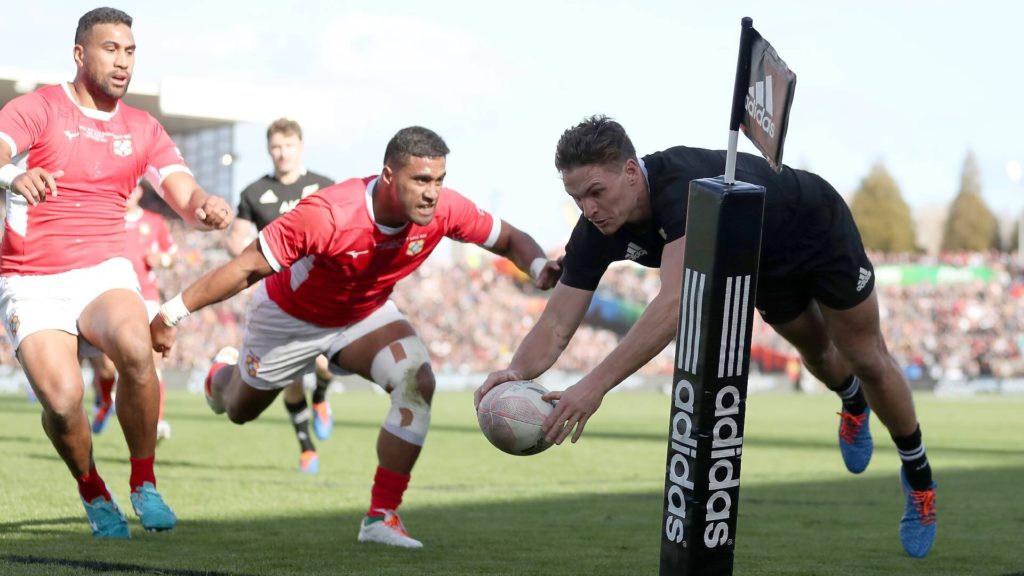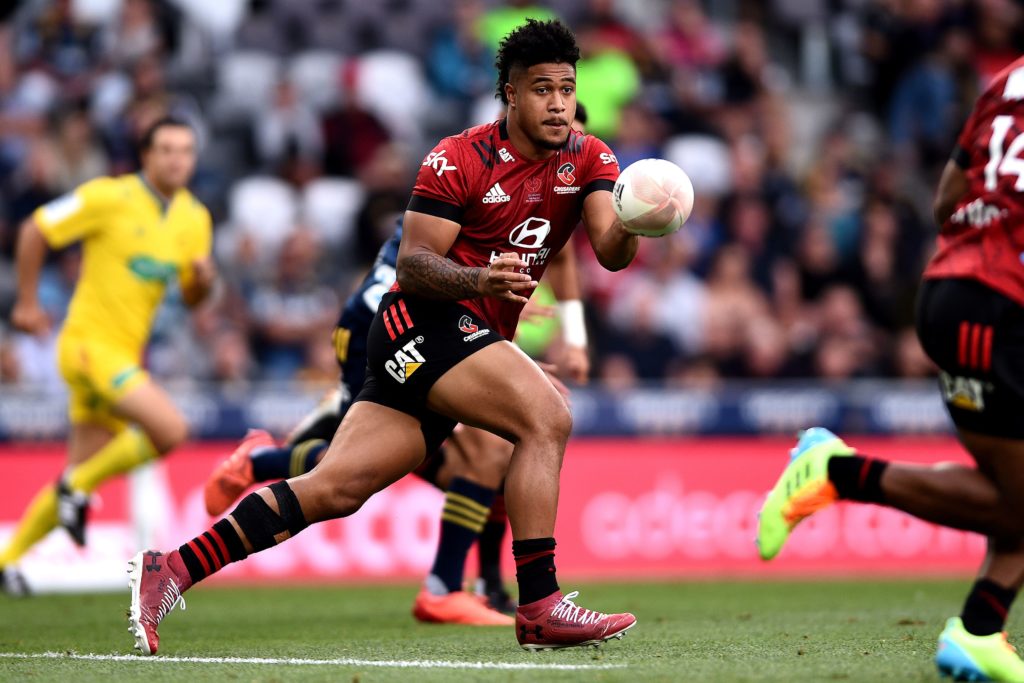As good as it might look on paper, July’s Steinlager Series between the All Blacks and New Zealand’s Pacific rugby neighbours has some familiar problems.
News of the three tests, one against Tonga and two against Fiji, has been warmly welcomed and heralded as a big win for Pacific rugby and yet another sign that the grass is starting to grow green for this crucially important part of the world game.
With the impending inclusion of Moana Pasifica and Fijian Drua in next year’s revamped Super Rugby, it’s quite true that the future is looking positive, but you’ve also got to bring a bit of balance to the upcoming July series and put it in its proper context.
Somewhat ironically, one of the most unlikely international series will begin in one of the unlikeliest places, with Mt Smart Stadium staging the All Blacks’ first hit out of 2021 against Tonga in what will be a big party atmosphere in South Auckland.
The likely outcome will be three matches that are tough to watch beyond their romantic appeal, with the many missed opportunities to take advantage of the occasion, especially to the benefit of the Island nations, on full show already.
Furthermore, the fact that the Black Ferns have no involvement in this is an absolute farce, but I digress.
Somewhat ironically, one of the most unlikely international series will begin in one of the unlikeliest places, with Mt Smart Stadium staging the All Blacks’ first hit out of 2021 against Tonga in what will be a big party atmosphere in South Auckland. As a curtain-raiser to that, the M?ori All Blacks will square off against Manu Samoa.
After that impending scoreboard bloodbath, Fiji will serve as back-to-back opponents for Ian Foster’s men.

Tickets will likely sell out, especially for the Mt Smart Stadium and Hamilton fixtures (with the latter also serving as a Rugby World Cup qualifier for Tonga), as there is a huge fanbase for the pacific sides in New Zealand’s North Island, in particular.
For NZR, the three matches will provide an important injection into the financial coffers after less than stellar crowds throughout the majority of Super Rugby Aotearoa.
But we need to talk about the so-called winners in all this – those being the three Pacific sides.
Sure, they’ll get some much-needed time on the paddock to develop their systems, players of international calibre, and heck, even their own coaches, but that’s not to say there isn’t an inherent problem with the menu that’s being put on the table in little over six weeks from now.
Not for the first time, the likes of Tonga, Fiji, and Samoa will have to pull together a test side with little to no preparation, and at the same time, do all they can to be competitive come matchday.
The results? Utter bloodbaths score wise. The entertainment value? Probably high if you’re a fan of seeing All Blacks run in try after try but pretty darn depressing for everyone else.
Now, not even the most glass-half-full type of rugby fan could argue that Tonga and Fiji will win any of these three tests; that’s simply not logical given where they’re at in comparison to the well-established machine that is the All Blacks.
Anyone who’s been watching when the Pacific sides have taken on the All Blacks in recent times would agree that, at best, the matches served to nothing but the detriment of any player not wearing the black jersey.
The results? Utter bloodbaths score wise. The entertainment value? Probably high if you’re a fan of seeing All Blacks run in try after try but pretty darn depressing for everyone else.
Think back to the match in Hamilton prior to Rugby World Cup 2019 when the All Blacks took Tonga to the sword, to the tune of 92-7. That was full proof that these matches mean vastly different things depending on what side of the ledger you’re on.

For Tonga, it was a rare chance to take on the All Blacks, prepare for the World Cup, and give many of their gunners a first look at international rugby against the best of the best, a rare feat that only happens once for many in that team.
For the All Blacks, it was a glorified training run to test some of their fringe talents like Josh Ioane, to give the selectors just another little look at what they were working with prior to the World Cup.
Not one paying customer would’ve walked out the gates of Waikato Stadium that day feeling that the occasion had served Pacific rugby well.
For Tonga and Fiji, hopefully the score line won’t blow out to such a degree when they again meet the All Blacks this July. That’s not to disrespect the Pacific Island sides, but there is no doubt that they’ll come into their respective fixtures against the All Blacks more underdone than at any other point in history.
Thanks to COVID and its restrictions, the spanner in the works that made this series a reality in the first place, the likes of Tonga, in particular, have had no rugby to speak of whatsoever. Fiji is currently the midst of dealing with its own virus outbreak, leaving head coach Vern Cotter scrambling to assemble the best side possible.
With the M?ori All Blacks in the fray also – it gets really tricky for national selectors in New Zealand – because where do you play which players?
It doesn’t bode well for anything resembling ideal preparation for a test against, of all teams, the All Blacks now does it?
“We would like to thank New Zealand Rugby and World Rugby for their support in giving us this great opportunity for our players, and likewise, our coaching panel,” Fiji Rugby Chief Executive John O’Conner said this week.
World Rugby has a requirement for the All Blacks to play during the home international window in July, as it does for the Wallabies, et cetera. When Italy pulled out of their tour to New Zealand, work immediately began on putting together a series involving the Pacific after Fiji were already slated to take on the All Blacks around the time of the Italian series.
But with the M?ori All Blacks in the fray also – it gets really tricky for national selectors in New Zealand – because where do you play which players?
This series fits as the perfect opportunity to blood some new talent in the All Blacks environment.

Whether or not Ian Foster and co seek to take that opportunity remains to be seen, but if not now, then when exactly is the ideal time? The likes of Ethan Blackadder, Leicester Fainga’anuku, Billy Harmon, Jona Nareki, Lachlan Boshier, Samisoni Taukei’aho, Bryn Hall, Mitch Drummond, and many others, would all be perfect candidates for getting their first taste of the test environment during this particular series.
That way it gives others, namely a few of the established All Blacks, a rest after what will be back-to-back Super Rugby campaigns.
Beauden Barrett could still make his return from sabbatical to the All Blacks in this series, this would give Richie Mo’unga the rest he so obviously needs and deserves.
Maybe then, Mo’unga would get the opportunity to come into the All Blacks fresh off a little rest, and then we can have a balanced debate about whether he’s the man to wear the No 10 jersey at the highest level moving forward.
Up until now, we’ve seen a tired Mo’unga in the black jersey. Don’t discount the impact that can have.
The experience, the expectations, and the training regimes that come with being part of Ian Foster’s All Blacks during a test week will be critical learnings for these fringe talents.
But with the M?ori All Blacks involvement in the Mt Smart fixture, it suddenly becomes a much more difficult exercise. From the outside looking in, and if history is anything to go by, some of the names mentioned above will go straight into that side and have that as their token international appearance during the July window.
Meanwhile, Ian Foster is left to name his strongest side, featuring all the names you’d expect. This gives him the freedom to tinker with positions ever so slightly, maybe take the gamble and try Jordie Barrett in the midfield and give Damian McKenzie the reigns at first five for three straight tests.
This way, Foster can still give Crusaders standout Will Jordon a solid crack at either fullback or on the wing in the test squad, as a starter over three consecutive weeks.
Nobody misses out per se, future prospects such as Pari Pari Parkinson and Quinn Tupaea get a taste of international footy, for the Maori All Blacks or otherwise, but it still feels like a bit of a missed opportunity.
The experience, the expectations, and the training regimes that come with being part of Ian Foster’s All Blacks during a test week will be critical learnings for these fringe talents, especially when you take into account the high number of tests the All Blacks will play during the Rugby Championship and their scheduled end of year tour. Foster, and the All Blacks, have an opportunity in July. With the Rugby World Cup not too far off, you’d rather blood these youngsters now in the very few low stakes games that are left.

Comments
Join free and tell us what you really think!
Sign up for free